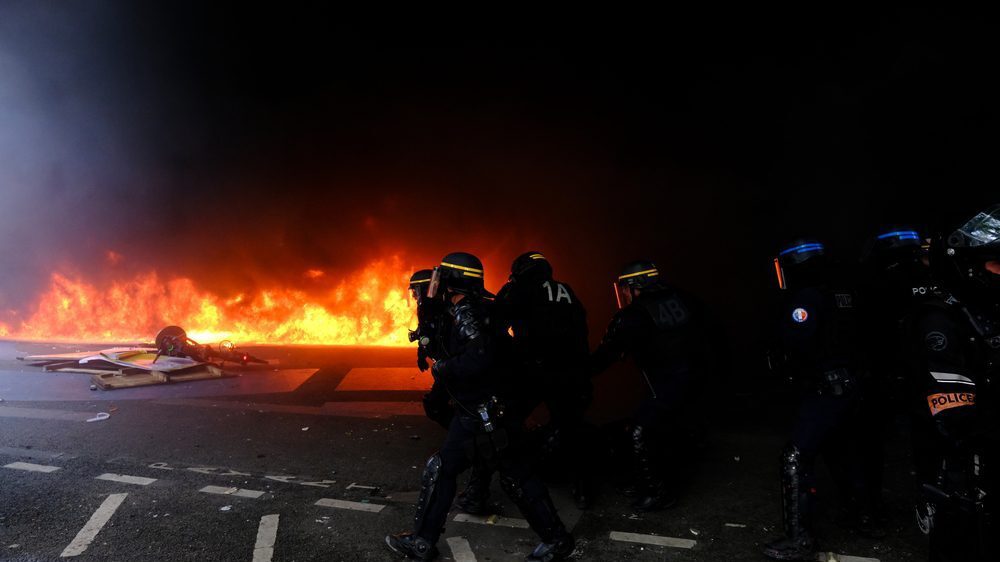
Photo: Alexandros Michailidis / Shutterstock.com
Recent turmoil on the streets of France is influencing the ongoing Polish election cycle as candidates on both the Left and the Right harden their stance on immigration in response to the week-long racial ferment.
Poland will hold crucial parliamentary elections later this year in a race that will pit the ruling centre-right PiS Party against the liberal opposition—primarily in the form of the Civic Coalition—as well as groups further to the Right, such as the insurgent Confederation Party who are critical of Warsaw’s increasing embrace of mass immigration.
Already, the issue of France and immigration from the Islamic world has become a political football in Poland as Prime Minister Mateusz Morawiecki cited the carnage in Paris during recent EU Council migration negotiations.
“Shops looted, police cars set on fire, barricades in the streets—this is now happening in the center of Paris and many other French cities. We don’t want such scenes on Polish streets … Stop illegal migration,” Morawiecki tweeted Friday evening, releasing a video comparing the riots to the relative quiet in Poland.
Polish Prime Minister Mateusz Morawiecki published footage of riots in #France, accompanied by footage of quiet life in #Poland. The phrase at the end of the video reads: "We do not want such scenes on the Polish streets."
— NEXTA (@nexta_tv) July 2, 2023
"Our plan is a Europe of safe borders. Security and… pic.twitter.com/KUWcOKZOOE
Talking points about the failure of multiculturalism in Western Europe have long been talking points for conservatives in the Eastern bloc, as a schism emerges in the EU over how to handle growing asylum numbers.
Both the Polish and Hungarian governments have used the French riots as political ammunition as they seek to move the balance of power in the EU to the East and reduce immigration both at home and for the bloc at large. The Polish government is currently looking for greater funding for the EU border agency, Frontex, and an end to the idea of asylum quotas imposed by Brussels where member states would be fined for each migrant they object to.
Surprisingly, the riots and the topic of mass immigration have been highlighted by the liberal opposition as Civic Coalition leader Donald Tusk released a video questioning whether or not Poland should accept large-scale Islamic settlement.
The leader of the Polish opposition, Donald Tusk, is under fire by liberals for what they consider a racist video
— Visegrád 24 (@visegrad24) July 2, 2023
He talks about riots in France, says Poland is letting in many migrants from Muslim countries &says Poland must regain control of its borders pic.twitter.com/IcKwCpgXok
Tusk, who served as EU Council president from 2014 to 2019 has previously spoken out against the flow of economic migrants into Europe, an opinion that before put him at odds with many EU leaders. His comments this week are likely to make some of his EPP colleagues uneasy, as a dispute about how to handle the topic of migration and potential alliance with populists rocks the centre-right faction.
Opinion polls show a small but substantial lead for PiS heading into the final months of the race as Brussels piles pressure on the conservative government with fallacious rule of law charges.
Preferencje partyjne w sondażu @united_surveys dla @wirtualnapolska (23-25 czerwca, zdecydowani wyborcy):@pisorgpl 33,5%@KO_Obywatelska 29,8%@KONFEDERACJA_ 14,8%@PL_2050 @nowePSL 12,8%@__Lewica 8,4%@AGROunia_ 0,7%
— Marcin Palade (@MarcinPalade) June 28, 2023
Frekwencja: 54,4%
Despite the pressure from progressives, Poland has witnessed a sudden rise of the nationalist Right in the form of the Confederation Party which has almost doubled in popularity over the past year and could act as kingmakers in any future coalition formation. Formed in a merger between nationalist groupings in 2018, the party takes a stronger Eurosceptic stance than PiS, as it accuses the ruling conservatives of selling Poland out by opening the door on immigration.
